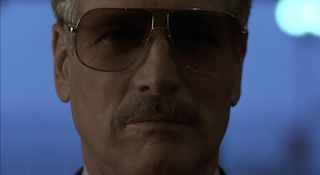James Woods received his first Oscar nomination for portraying Richard Boyle in Salvador.
Salvador depicts the civil war in El Salvador.
James Woods portrays Richard Boyle who is a photo journalist of sorts. He goes for the most dangerous of places to cover, and gets rather far too involved. Boyle though is not particularly successful as a journalist, but seems to get on by taking drugs, drinking a lot, as well as being a womanizer, well he attempts to find something in the rather unstable areas that he inhabits.
James Woods was probably the perfect choice for the almost out of control Richard Boyle, since Woods is an actor who by nature as an incredibly high energy level in almost all of his performances. Woods' kinetic style works extremely well for Boyle right from the start of his performance. Woods does not stop for a moment perfectly amplifying the never stopping nature of Richard in this film, which Woods sets up instantly which really is needed for the film.
The setup of the film has Boyle rush basically down to Salvador to cover the civil war that almost seems like a whim on his part considering he drives right down there right into it. Woods whole creation of Boyle is perfect for this because he constantly shows Boyle as a guy with excess energy who never stops, never stops to even think for a second what he is that he is about to get himself into.
Woods is quite effective in Salvador as he readily tries to deal with the various troubles he faces well there, Woods basically never stops being at least to some degree hectic in his performance.This works perfectly with Boyle who is constantly trying to cover the story in Salvador, fight with various officials about the horrors there, deal with seeing the horrors, as well attempting to save a few people who are threatened because they are there.
Woods' reactions to the various horrors as Boyle sees them in Salvador is interestingly handled by Woods, because Woods rarely freaks out despite what he sees. It is not that Boyle is unaffected by what he sees, but rather Woods shows more restrained reactions that properly Boyle simply throughout his life has seen horrors, although Woods still certainly shows that Boyle is effected but less because of his history as a photojournalist.
Boyle becomes slowly even more ingrained in the situation, and stops seeing it as just an opportunity to drink, get high, and get a story, and instead starts to see it as somewhere where he can finally possibly do a little good. Boyle attempts to try to persuade the U.S. not to be involved anymore with current government in Salvador due to its use of death squads.
Throughout the second half of the film Boyle has several speeches in which he espouses what he believes about the rights of humanity, and his belief in justice. Although these probably could be written a tad better by Oliver Stone who never is afraid to be heavy handed or extremely obvious, they still are effective because Woods always puts an earnest truth in his performance as Boyle. Woods here shows a more caring side of Boyle that comes out extremely well, and it seems this side was always there, he just happens to not always shows.
Interestingly Woods actually has another transformation in this film as Boyle, as Boyle actually morally changes a bit, and actually feels he must change his behavior in his attempt to save a local woman whom he loves. Woods is excellent in this aspect because Woods lets on that early he more of does see her as one of his women, but slowly as the truth of the situation dwells on his Woods carefully shows that this particularly woman maybe does mean more to Boyle after all.
Boyle's moral transition is powerfully played by Woods, and he surprisingly is able to make it seem rather natural despite how deeply into his amoral lifestyle he was at the beginning. His whole change is best summed by his confession to the priest where he tells the priest his honest desire to change. Woods plays this authentically as he does not show Boyle is a completely different man, but a man who has actually learned more about himself, and finally feels responsibility weigh on him.
This is a surprisingly in depth performance, since many times film's like this do not bother to give that much attention to the reporter in the center of it, usually using them as a reactionary individual. Woods though succeeds at both being someone you can follow through the entire painful affair he goes through, as well as gives an interesting portrait of a man who finds more about himself in the strangest of times.














